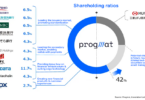In May 2020, Kaga City partnered with xID, a blockchain identity company and Trust Bank to create its LoGo (local government) Form Electronic Application. LoGo has now started to be used throughout the city, located in Japan’s Ishikawa Prefecture, with plans to expand this service to local governments across the country.
LoGo, based on blockchain technology, can be used by residents to complete administrative procedures online and allows local governments to easily and quickly create administrative forms. All that’s needed is a smartphone with the xID app installed, and a My Number card (Kojin Bangō). The My Number card, introduced in 2015, is the Japanese social security and taxation ID card. LoGo uses xID’s digital ID app for personal authentication, to verify user identity.
Meanwhile, xID (previously blockhive) was started by Japanese developers with experience in the Estonian market. The focus is on connecting the My Number card to its xID app, which stores basic details such as name, gender, birth date, and address. The personal information is not stored on the blockchain, which is used to record authentication and signature logs. If the user chooses to, they can share the data electronically. We believe the solution uses Ethereum, but this has not been confirmed.
Kaga City hopes LoGo will improve governmental work efficacy and increase resident convenience. While the local government already provides convenient administration services, it encourages further service digitalization, even incentivizing residents to use its new digital service by providing each new applicant with a 5,000 yen (46,80 $) gift certificate. It is also hoped that LoGo will encourage Japan’s residents to use a My Number card, with only 16.7% of citizens owning a card by the end of May 2020, as reported by The Japan Times.
Earlier this month, Japan’s Ministry of Economy, Trade and Industry (METI) promoted blockchain technology as a means to digitize trade in the ASEAN region, where Japan is currently the rotating leader.
METI was also involved in the European Blockchain Partnership’s 2018 Declaration on digitalization using blockchain technology and is becoming increasingly involved in blockchain innovations in areas such as finTech, food traceability, trade, and now, public services.






